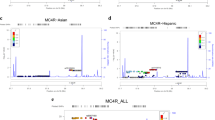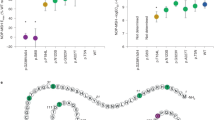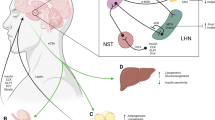Abstract
Background:
Previous studies have suggested that a variant in the melanocortin-4 receptor (MC4R) gene is important in protecting against common obesity. Larger studies are needed, however, to confirm this relation.
Methods:
We assessed the association between the V103I polymorphism in the MC4R gene and obesity in three UK population based cohort studies, totalling 8304 individuals. We also did a meta-analysis of relevant studies, involving 10 975 cases and 18 588 controls, to place our findings in context.
Finding:
In an analysis of all studies, individuals carrying the isoleucine allele had an 18% (95% confidence interval 4–30%, P=0.015) lower risk of obesity compared with non-carriers. There was no heterogeneity among studies and no apparent publication bias.
Interpretation:
This study confirms that the V103I polymorphism protects against human obesity at a population level. As such it provides proof of principle that specific gene variants may, at least in part, explain susceptibility and resistance to common forms of human obesity. A better understanding of the mechanisms underlying this association will help determine whether changes in MC4R activity have therapeutic potential.
This is a preview of subscription content, access via your institution
Access options
Subscribe to this journal
Receive 12 print issues and online access
$259.00 per year
only $21.58 per issue
Buy this article
- Purchase on Springer Link
- Instant access to full article PDF
Prices may be subject to local taxes which are calculated during checkout

Similar content being viewed by others
References
Farooqi IS, Keogh JM, Yeo GSH, Lank EJ, Cheetham T, O'Rahilly S . Clinical spectrum of obesity and mutations in the melanocortin 4 receptor gene. N Engl J Med 2003; 348: 1085–1095.
Vaisse C, Clement K, Durand E, Hercberg S, Guy-Grand B, Froguel P . Melanocortin-4 receptor mutations are a frequent and heterogeneous cause of morbid obesity. J Clin Invest 2000; 106: 253–262.
Geller F, Reichwald K, Dempfle A, Illig T, Vollmert C, Herpertz S et al. Melanocortin-4 receptor gene variant I103 is negatively associated with obesity. Am J Hum Genet 2004; 74: 572–581.
Lohmueller KE, Pearce CL, Pike M, Lander ES, Hirschhorn JN . Meta-analysis of genetic association studies supports a contribution of common variants to susceptibility to common disease. Nat Genet 2003; 33: 177–182.
Ioannidis JPA, Trikalinos TA, Ntzani EE, Contopoulos-Ioannidis DG . Genetic associations in large versus small studies: an empirical assessment. Lancet 2003; 361: 567–571.
Day N, Oakes S, Luben R, Khaw KT, Bingham S, Welch A et al. EPIC-Norfolk: study design and characteristics of the cohort. European Prospective Investigation of Cancer. Br J Cancer 1999; 80 (Suppl 1): 95–103.
Williams DRR, Wareham NJ, Brown DC, Byrne CD, Clark PMS, Cox BD et al. Undiagnosed glucose intolerance in the community: the Isle of Ely Diabetes Project. Diabet Med 1995; 12: 30–35.
Wareham NJ, Byrne CD, Williams R, Day NE, Hales CN . Fasting proinsulin concentrations predict the development of type 2 diabetes. Diabetes Care 1999; 22: 262–270.
Gotoda T, Scott J, Aitman TJ . Molecular screening of the human melanocortin-4 receptor gene: identification of a missense variant showing no association with obesity, plasma glucose, or insulin. Diabetologia 1997; 40: 976–979.
Gu W, Tu Z, Kleyn PW, Kissebah A, Duprat L, Lee J et al. Identification and functional analysis of novel human melanocortin-4 receptor variants. Diabetes 1999; 48: 635–639.
Ohshiro Y, Sanke T, Ueda K, Shimajiri Y, Nakagawa T, Tsunoda K et al. Molecular scanning for mutations in the melanocortin-4 receptor gene in obese/diabetic Japanese. Ann Hum Genet 1999; 63: 483–487.
Dubern B, Clement K, Pelloux V, Froguel P, Girardet J-P, Guy-Grand B et al. Mutational analysis of melanocortin-4 receptor, agouti-related protein, and alpha-melanocyte-stimulating hormone genes in severely obese children. J Pediatr 2001; 139: 204–209.
Rosmond R, Chagnon M, Bouchard C, Bjorntorp P . A missense mutation in the human melanocortin-4 receptor gene in relation to abdominal obesity and salivary cortisol. Diabetologia 2001; 44: 1335–1338.
Miraglia del Giudice E, Cirillo G, Nigro V, Santoro N, D'Urso L, Raimondo P et al. Low frequency of melanocortin-4 receptor (MC4R) mutations in a Mediterranean population with early-onset obesity. Int J Obes 2002; 26: 647–651.
Jacobson P, Ukkola O, Rankinen T, Snyder EE, Leon AS, Rao DC et al. Melanocortin 4 receptor sequence variations are seldom a cause of human obesity: the Swedish Obese Subjects, the HERITAGE Family Study, and a Memphis Cohort. J Clin Endocrinol Metab 2002; 87: 4442–4446.
Branson R, Potoczna N, Kral JG, Lentes K-U, Hoehe MR, Horber FF . Binge eating as a major phenotype of melanocortin 4 receptor gene mutations. N Engl J Med 2003; 348: 1096–1103.
Marti A, Corbalan MS, Forga L, Martinez JA, Hinney A, Hebebrand J . A novel nonsense mutation in the melanocortin-4 receptor associated with obesity in a Spanish population. Int J Obes 2003; 27: 385–388.
Valli-Jaakola K, Lipsanen-Nyman M, Oksanen L, Hollenberg AN, Kontula K, Bjorbaek C et al. Identification and characterization of melanocortin-4 receptor gene mutations in morbidly obese Finnish children and adults. J Clin Endocrinol Metab 2004; 89: 940–945.
Santini F, Maffei M, Ceccarini G, Pelosini C, Scartabelli G, Rosellini V et al. Genetic screening for melanocortin-4 receptor mutations in a cohort of Italian obese patients: description and functional characterization of a novel mutation. J Clin Endocrinol Metab 2004; 89: 904–908.
Rutanen J, Pihlajamaki J, Karhapaa P, Vauhkonen I, Kuusisto J, Moilanen Mykkanen L et al. The Val103Ile polymorphism of melanocortin-4 receptor regulates energy expenditure and weight gain. Obes Res 2004; 12: 1060–1066.
Larsen LH, Echwald SM, Sorensen TI, Andersen T, Wulff BS, Pedersen O . Prevalence of mutations and functional analyses of melanocortin 4 receptor variants identified among 750 men with juvenile-onset obesity. J Clin Endocrinol Metab 2005; 90: 219–224.
Loos RJF, Rankinen T, Tremblay A, Pérusse L, Chagnon Y, Bouchard C . Melanocortin-4 receptor gene and physical activity in the Québec Family Study. Int J Obes 2005; 29: 420–428.
Heid IM, Vollmert C, Hinney A, Doring A, Geller F, Lowel H et al. Association of the 103I MC4R allele with decreased body mass in 7937 participants of two population based surveys. J Med Genet 2005; 42: e21.
Hinney A, Hohmann S, Geller F, Vogel C, Hess C, Wermter A-K et al. Melanocortin-4 receptor gene: case–control study and transmission disequilibrium test confirm that functionally relevant mutations are compatible with a major gene effect for extreme obesity. J Clin Endocrinol Metab 2003; 88: 4258–4267.
Ho G, MacKenzie RG . Functional characterization of mutations in melanocortin-4 receptor associated with human obesity. J Biol Chem 1999; 274: 35816–35822.
Xiang Z, Litherland SA, Sorensen NB, Wood MS, Shaw AM, Millard WJ et al. Pharmacological characterization of 40 human melanocortin-4 receptor polymorphisms with the endogenous proopiomelanocortin-derived agonists and the agouti-related protein (AGRP) antagonist. Biochemistry 2006; 45: 7277–7288.
Bewick GA, Gardiner JV, Dhillo WS, Kent AS, White NE, Webster Z et al. Postembryonic ablation of AgRP neurons in mice leads to a lean, hypophagic phenotype. FASEB J 2005; 19: 1680–1682.
Graham M, Shutter JR, Sarmiento U, Sarosi I, Stark KL . Overexpression of Agrt leads to obesity in transgenic mice. Nat Genet 1997; 17: 273–274.
Ollmann MM, Wilson BD, Yang Y-K, Kerns JA, Chen Y, Gantz I et al. Antagonism of central melanocortin receptors in vitro and in vivo by agouti-related protein. Science 1997; 278: 135–138.
Schwartz MW, Woods SC, Porte Jr D, Seeley RJ, Baskin DG . Central nervous system control of food intake. Nature 2000; 404: 661–671.
Farooqi IS, Yeo GSH, Keogh JM, Aminian S, Jebb SA, Butler G et al. Dominant and recessive inheritance of morbid obesity associated with melanocortin 4 receptor deficiency. J Clin Invest 2000; 106: 271–279.
Hinney A, Schmidt A, Nottebom K, Heibult O, Becker I, Ziegler A et al. Several mutations in the melanocortin-4 receptor gene including a nonsense and a frameshift mutation associated with dominantly inherited obesity in humans. J Clin Endocrinol Metab 1999; 84: 1483–1486.
Herpertz S, Siffert W, Hebebrand J . Binge eating as a phenotype of melanocortin 4 receptor gene mutations. N Engl J Med 2003; 349: 606–607.
Hebebrand J, Geller F, Dempfle A, Heinzel-Gutenbrunner M, Raab M, Gerber G et al. Binge-eating episodes are not characteristic of carriers of melanocortin-4 receptor gene mutations. Mol Psychiatry 2004; 9: 796–800.
Acknowledgements
We gratefully acknowledge the support of corresponding authors:
Dr C Bouchard, Dr P Jacobson, Dr RJF Loos Human Genomics Laboratory, Pennington Biomedical Research Center, USA; Dr IM Heid, Dr T Illig GSF National Research Center for Environment and Health, Institute of Epidemiology, Neuherberg, Germany; Professor Winfried Rief Department of Psychology, Philipps-University of Marburg, Germany; Professor S Herpertz Department for Psychosomatic Medicine and Psychotherapy, Westfälisches Zentrum for Psychiatry, Psychotherapy and Psychosomatics, Dortmund, Germany; Dr M Laakso, Dr J Pihlajamäki Department of Medicine, University of Kuopio, Finland; Dr F Santini Department of Endocrinology and Metabolism, University of Pisa, Italy.
Deborah Smyth and John Todd with Juvenile Diabetes Research Foundation and Wellcome Trust funding are thanked for genotyping some of the EPIC samples. Genotyping of additional German samples was funded by the German National Genome Net-2.
The analyses in this paper were conducted as part of the Genes in Energy Balance and Metabolism (GEM) Consortium between the MRC Epidemiology Unit, the Sanger Institute and University of Cambridge. The MRC Ely Study is supported by the MRC and the EPIC-Norfolk Study by programme grants from the MRC and CRUK with additional support from the European Union, Stroke Association, British Heart Foundation, Department of Health, Food Standards Agency and the Wellcome Trust. IB is funded by The Wellcome Trust. SO'R, IB and JH acknowledge support from EU FP6 funding (contract no. LSHM-CT-2003–503041). EHY is an MRC Career Development Fellow.
Author information
Authors and Affiliations
Corresponding author
Rights and permissions
About this article
Cite this article
Young, E., Wareham, N., Farooqi, S. et al. The V103I polymorphism of the MC4R gene and obesity: population based studies and meta-analysis of 29 563 individuals. Int J Obes 31, 1437–1441 (2007). https://doi.org/10.1038/sj.ijo.0803609
Received:
Revised:
Accepted:
Published:
Issue Date:
DOI: https://doi.org/10.1038/sj.ijo.0803609
Keywords
This article is cited by
-
Unexpected identification of obesity-associated mutations in LEP and MC4R genes in patients with anorexia nervosa
Scientific Reports (2024)
-
The heritability of body composition
BMC Pediatrics (2021)
-
Evaluation of the MC4R gene across eMERGE network identifies many unreported obesity-associated variants
International Journal of Obesity (2021)
-
Heterozygous versus homozygous phenotype caused by the same MC4R mutation: novel mutation affecting a large consanguineous kindred
BMC Medical Genetics (2018)
-
Association between LEPR, FTO, MC4R, and PPARG-2 polymorphisms with obesity traits and metabolic phenotypes in school-aged children
Endocrine (2018)



